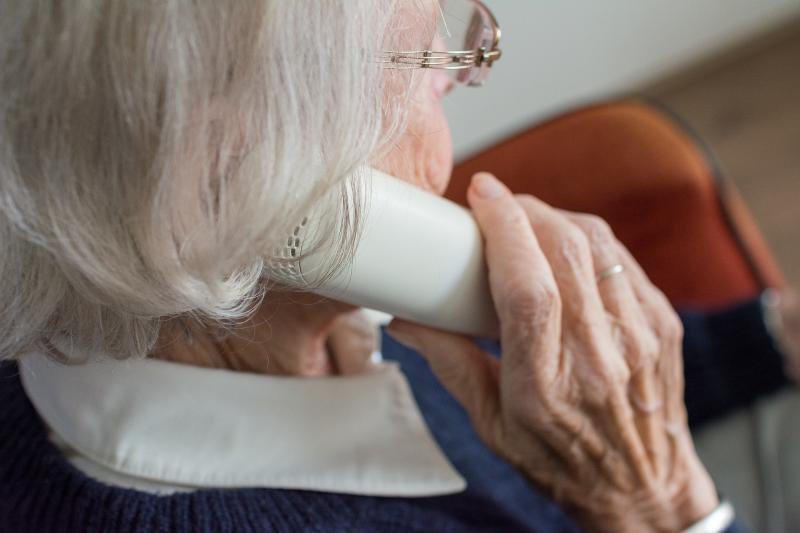An innovative elderly healthcare app looks out for old people in their homes with artificial intelligence so they don’t have to operate tricky technology
When explaining her motivation for setting up Tucuvi, a start-up that created a system guided by artificial intelligence to monitor the health of elderly residents by phone, María González Manso talks about her friend and neighbour Carmen. Carmen is an elderly woman who lives in Segovia, the Spanish town where María grew up and where her family still lives. “She’s 80 years old and has multiple chronic conditions that need monitoring”, María says, “and she didn’t have the tools to stay safely and healthily at home”.
The more María looked for solutions for Carmen, the more she realised that many people were in the exact same situation. “On the one hand, that’s because a lot of the tools available won’t work for Carmen — she and more than 80% of the elderly population do not use mobile apps or wearables like smart watches”, María says. “On the other there aren’t enough health care professionals to provide the level of care this population needs”.

María, who is a biomedical engineer by training, and Tucuvi co-founder Marcos Rubio Rubio, another biomedical engineer, wanted to find a way to use the technology they’d been working with to find a solution that would help keep elderly people as healthy and safe as possible at home while managing chronic conditions.
Together they created Tucuvi — a virtual caregiver that uses artificial intelligence to call and check in on elderly patients, monitoring their responses and reporting back to clinics and hospitals when the system detects the need for in-person intervention. This circumvents the need for an elderly patient who isn’t tech savvy to know how to operate a computer or a smartphone.
A daily health check only a call away
“Our goal is to see that every elderly person who needs it has continuous care at home”, María says. “The artificial intelligence ─AI─voice talks to the patients the same way a nurse would.”
At the same time, she says, the system helps over-stretched hospital and healthcare systems manage caseloads better by allowing them to focus their attention on those who need it and in a timely way.
Tucuvi was one of the finalists in the 2020 Social Innovation Tournament, a flagship initiative of the European Investment Bank Institute, recognising and supporting the best European entrepreneurs whose primary purpose is to generate a social, ethical or environmental impact.
Tucuvi serves several hospitals and healthcare organisations in Spain and Portugal, but is planning an expansion to South America, María says. The company’s goal is to have 100 000 patients by the end of 2021.
The company tailors its programme to the needs of the hospital or healthcare system that incorporates Tucuvi in its services. For each different region, and for each different disease being monitored, the AI must be trained to ask the right questions and to understand the dialect and idioms used by elderly patients. This process takes up to three months. “After that the AI starts to learn on its own”, María explains.
Timely support during the COVID-19 crisis
The Tucuvi programme is being used for patients with chronic cardiac issues, cancer, and respiratory health problems. Depending on the requirements of the healthcare provider, Tucuvi can provide different kinds of services. For patients with conditions like dementia or Alzheimer’s disease, for example, Tucuvi can include games that stimulate memory, language, and problem-solving skills.
Tucuvi has also been involved in helping manage the COVID-19 crisis. “We’ve been working with a hospital providing continuous monitoring of COVID patients at home”, Maria says, “and the result was that 85% of the calls could be handled by our call system, so we just direct 15% of the calls to the hospital. This helped optimise their time and the patients were getting the attention they need”.

Tucuvi is beginning to look at ways that it can use artificial intelligence to listen to how people respond to questions, as well as the simple content of the response, María describes.
“We can listen to some calls and hear people saying ‘Yes, I’m O.K., everything is alright,’ but they’re crying”, she says, speaking of some COVID patients. “They’re saying they’re O.K. because they don’t want to bother anyone. So we realised we had to also analyse how they are feeling”.
This is another aspect the artificial intelligence can be trained to detect.
One of the goals for Tucuvi is to help elderly patients stay at home, avoiding the stress and anxiety of being moved into care facility or having to go to the hospital in a sudden crisis.
“This is part of our objective”, she says, “if you can’t stay healthy, you can’t stay at home”.
As for María’s friend Carmen, she is still living at home in Segovia and remains very active in the neighbourhood. “I saw her yesterday”, María smiles. “She is doing things like making cookies for us. The important thing is that she knows we’re there.”
